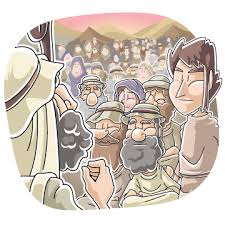Joshua 5:1 – As soon as all the kings of the Amorites who were beyond the Jordan to the west, and all the kings of the Canaanites who were by the sea, heard that the Lord had dried up the waters of the Jordan for the people of Israel until they had crossed over, their hearts melted and there was no longer any spirit in them because of the people of Israel.
This scripture specifically mentions the Amorites and the Canaanites.
The term 'Canaanite' is a generic name that collectively refers to any or all of the kingdoms living in the region of the Promise Land. These would include the Hittites, Hivites, Jebusites, Girgashites, Perizzites, etc.
The Amorites were a specific kingdom whose people dwelt on both sides of the Jordan. Israel had already defeated two of their strongest kings (Sihon and Og) under the leadership of Moses. They may be mentioned separately because they were considered the most valiant/fierce of the Canaanites.
The people of Canaan were no doubt trusting in the swollen, raging Jordan River to protect their borders from Israelite invasion for several weeks. They considered the river to be an impenetrable barrier of defense, and under normal circumstances, they would be correct.

However, our God is anything but normal/routine! The Canaanites knew that Jehovah had blocked the river and allowed Israel to cross over on dry land. This was irrefutable proof that God was on the side of Israel.
In some ways we could say that the conquest had already begun because this demonstration of God's power caused a spirit of dread/helplessness to overcome the Canaanite (and Amorite) people, making them weak and fearful.
But before Israel began to engage in any military campaigns, they had to prepare themselves before God.
Joshua 5:2-3 – At that time the Lord said to Joshua, "Make flint knives and circumcise the sons of Israel a second time." So Joshua made flint knives and circumcised the sons of Israel at Gibeath-haaraloth.
Before the use of iron was common, all nations of the earth used stone/flint to make sharp edged tools. (Perhaps you may have found a stone arrowhead somewhere out in the woods near your home.)
Interestingly, Israel continued to use knives of stone for circumcision and other sacred purposes, even after they were able to manufacture iron. For example, when Zipporah (the wife of Moses) had to circumcise her son, she used a stone instrument:
Exodus 4:25 - Then Zipporah took a sharp stone, and cut off the foreskin of her son, and cast it at his feet, and said, Surely a bloody husband are you to me.
In fact, both scriptural and historical accounts of circumcision show that the procedure was carried out with stone knives as opposed to metal knives. Because of these accounts, scholars surmise that the Hebrews considered it unlawful to use metal of any kind in circumcision.

Why would that be?
Although we don't know for sure, we can make an educated guess. We know that when God commanded Israel to make an altar it could not be an altar of hewn stones (stones shaped with a hammer or an axe). According to God, the use of man-made metal tools on the rock would pollute it:
Exodus 20:25 - And if you will make me an altar of stone, you shall not build it of hewn stone: for if you lift up your tool upon it, you have polluted it.
If a tool of iron polluted the altar which was used to dedicate sacrifices to God, then likewise a tool of iron would pollute a person if used in a rite/ritual in which the body and soul of that person were being dedicated to God.
Furthermore, the early church fathers believed that circumcision with a flint or rock was symbolic of the true circumcision of the heart performed by Jesus, who was more than once referred to as the Rock (I Corinthians 10:4).
Romans 2:29 - But he is a Jew, who is one inwardly; and circumcision is that of the heart, in the spirit, and not in the letter; whose praise is not of men, but of God.
So, because of the symbolism of physical circumcision (which we will look at shortly), it was important that man-made metal tools not be used in the process.
Notice in verse two that God tells Joshua to 'circumcise the sons of Israel a second time'.
This does not mean that individuals who had already been circumcised underwent the procedure a second time. Verses 4-7 make it clear that God was referring to a continuation or a renewal of the ceremony of circumcision which had no doubt fallen into disuse during the wilderness wandering.
Because so many males were circumcised at the same time, that place became known as Gibeath-haaraloth which is translated 'hill of the foreskins'.
Joshua 5:4-5 – And this is the reason why Joshua circumcised them: all the males of the people who came out of Egypt, all the men of war, had died in the wilderness on the way after they had come out of Egypt. Though all the people who came out had been circumcised, yet all the people who were born on the way in the wilderness after they had come out of Egypt had not been circumcised.
Verses 4-7 give us more detail about who was circumcised and why. Before we get into the specifics of this, let's remind ourselves of a few facts regarding circumcision:
- Circumcision ('cutting around') refers to the practice of cutting away the foreskin of the male reproductive organ.
- The practice of circumcision existed in a limited way before God established the nation of Israel. However, by the command of God it became the distinguishing physical mark of the covenant between God and his people (Genesis 17:10-14).
- Every male in Israel had to be circumcised. This was done on the 8th day of life (Genesis 17:1, Leviticus 12:3, Acts 7:8).
- Every slave (Genesis 17:12-13) and every foreigner/proselyte also had to be circumcised before they could enjoy citizenship in Israel (Exodus 12:48, Ezekiel 44:9).
- Any male who was not circumcised was cut off from the fellowship of Israel and the covenant with God (Genesis 17:14).
- No one was permitted to participate in Passover unless he was circumcised. This applied to those who were born as Israelites as well as those who converted (Exodus 12:48).
Now, let's consider who was already circumcised at the time Israel crossed the Jordan, and who was not.
Joshua 5:6 – For the people of Israel walked forty years in the wilderness, until all the nation, the men of war who came out of Egypt, perished, because they did not obey the voice of the Lord; the Lord swore to them that he would not let them see the land that the Lord had sworn to their fathers to give to us, a land flowing with milk and honey.
We know that Israel fully celebrated Passover at Mount Sinai in the first month of the second year of their deliverance from Egypt (Numbers 9:1-5). Therefore, we know that all of the men born up until that time had been circumcised.
Numbers 9:1-2 - And the LORD spoke unto Moses in the wilderness of Sinai, in the first month of the second year after they were come out of the land of Egypt, saying, Let the children of Israel also keep the Passover at its appointed time.
However, shortly after celebrating this Passover, the men of Israel rebelled against God and refused to go into battle to claim the Promised Land (Numbers 13). As punishment, God declared that Israel would wander in the wilderness for 40 years, until that rebellious generation had died (Numbers 14:6-35). During these years of wandering, they did not circumcise their male children; nor did they celebrate Passover.

Keep in mind, God was very specific that this punishment applied to males who were 20-years-old and older. This means that any males younger than 20 would have been circumcised at Sinai, and they would still have been alive after the years of wandering.
So as Israel crossed the Jordan, they had a whole group of men who were roughly between the ages of 40-59 who had been circumcised at Sinai. Then they had a whole younger generation (under 40 years) who had not been circumcised. Obviously, this younger generation included most of the fighting men.
Why didn't Israel circumcise their male children during the period of wandering?
Joshua 5:7 – So it was their children, whom he raised up in their place, that Joshua circumcised. For they were uncircumcised, because they had not been circumcised on the way.
Do you have any ideas as to why Israel did not circumcise their children during the wilderness wandering?
In order to fully understand the reason, we need to know why God required circumcision in the first place.
Israel was (and still is) God's chosen nation/people. They were to be separated from the world and consecrated to God. They had the privilege of living in covenant with the creator of all things. They had the honor of bringing the blessings of God to the whole world; Jesus the Messiah came through their lineage.
As God's chosen people, they were set apart for his glory. They were never to worship false idols/gods like the nations around them. They were to be holy just as God was holy; they must adhere to the laws and covenant of God. They were to follow wherever God led them, and obey his voice at all times.
But on that fateful day when they believed the report of the ten spies, they essentially broke their covenant with God and entered into rebellion. Since their relationship with God was broken, there was no point in celebrating the Passover or circumcising their children.
But God, in his great mercy, did not fully break off the covenant. (Thankfully, his victory is not dependent upon us!!). Instead, he decreed a 40 year period of wandering during which those in rebellion died. After they were gone, God then renewed his covenant with their offspring/children.
Thus, we witness God's great power, wisdom and might – He has once again brought Israel to the border of the Promised Land and he is once again calling upon his people to take the land. Before that happens, the covenant is renewed – the males are circumcised and the Passover is celebrated.
Joshua 5:8 – When the circumcising of the whole nation was finished, they remained in their places in the camp until they were healed.
Why would Holy Spirit cause so much emphasis to be placed on circumcision in this portion of scripture? The answer is that it holds an important lesson for today!
Circumcision in the flesh was a type or foreshadowing of the circumcision of the heart that takes place under the dispensation of grace.
Remember, circumcision was a sign that the people were in covenant with God and consecrated to him. Now, during the age of grace, we too are in a covenant with God (a much better covenant, I might add – Hebrews 8:6). Part of that covenant is living a life of holiness:
1 Peter 1:15-16 - But as he who has called you is holy, so be holy in all manner of conduct; Because it is written, You will be holy; for I am holy.
Where are you at right now in your walk with Christ? We are living in times of great change; God is raising up warriors for his army who will do battle in the spiritual realm and take this world for the kingdom of heaven. Do you want to be part of that?

If so, it's time to recommit to the covenant, just as the children of Israel were called to do, before they partnered with God to take the Promised Land. It's time for us to circumcise our hearts and rid ourselves of the pollution of sin.
In Romans chapter two, Paul discourses on the subject of circumcision. He concludes that circumcision is a matter of the heart, by the Spirit of God (Romans 2:28-29). It is of vital importance that we allow Holy Spirit to come into our lives and do a work of circumcision - of cutting away and removing the sins that still abide in our lives.
Colossians 2:11 - In whom also you are circumcised with the circumcision made without hands, in putting off the body of the sins of the flesh by the circumcision of Christ:
We all have sin in our lives that we know about. In these cases, we must surrender that sin to God and ask Holy Spirit to help us weed it out of our lives. We need him to help us pluck it up by the roots, so it is completely gone.
In addition, we all have sin that we are probably not aware of. Sometimes things like anger, unforgiveness or greed can lurk in the shadows of our hearts, staying away from the light. We would be wise to ask Holy Spirit to search our hearts and reveal any hidden weaknesses in our lives:
Psalm 139:23-24 - Search me, O God, and know my heart: try me, and know my thoughts: And see if there be any wicked way in me, and lead me in the way everlasting.
We need to prepare ourselves to be mighty warriors in the kingdom of God.
Consider this: The need to adhere to God's covenant is not just a mandate for us as individuals. As the collective church, we need to be careful to adhere to the holy teachings outlined in God's word. God does not condone the killing of children (abortion), injustice or rampant sexual sin of any kind. The church is to love and embrace people, but not their sin. This can be a difficult distinction to make, but Holy Spirit will assist us as we lean on him.

And as you have already guessed, there are national implications as well.
As a nation, America was founded on a covenant with God. We are devoted to Him, just as Israel was/is. Our original mandate was to make this nation free under God and to spread the gospel message from shore to shore and around the world. It is time for the Christians of America to do battle in the spiritual realm to take this nation back for Jesus Christ!
Let me offer you some encouragement:
I don't know about you, but I love leisure and comfort. If I could have that 24/7, I would be tempted to take it!
But we are not on this planet for that purpose. As soldiers in the kingdom of God, we are to wage war on our enemy. We are to train ourselves for service through personal sanctification and holiness. We are called upon to be an active member of our military unit (our individual church) and we are called upon to engage the enemy through prayer, declarations and Holy Spirit guided action.
So I encourage you – join God's army today and get busy!
Let me offer you some relief:
It would be difficult for the enemy to trick us with things that are blatantly evil; we would see that trap a mile away. Instead, his tactics are much more subtle. He often uses innocent activities or interests to keep us so busy that we take our eyes off the spiritual realm. When that happens, we become ineffective soldiers for the kingdom.
But it doesn't have to be that way. Examine yourself. If you are spending less and less time in prayer and kingdom warfare, take the initiative to make a change!
Disengage yourself from some of the things that are taking up the time you should be spending in prayer, fasting and reading the word. Rededicate yourself to kingdom work!
Let me offer you some strength:
We know that as Christians, the battle never depends on our own strength or wisdom; the victory has already been won by Christ Jesus our Lord.
So don't be weary or afraid to engage in battle. The enemy is definitely going to fight back, but he is already defeated. As we enforce the kingdom of heaven on earth we will have the privilege of working closely with the God of the universe; we will see him do mighty miracles on behalf of the church.
Are you ready for battle?
